The demand for construction workers is now at an all-time high, while the number of young people entering the workforce has remained stagnant. With the current workforce aging out, the industry needs young people more than ever to help build the places in which we live, work, and play.
Careers in Construction Month is a campaign with the mission to raise awareness of the professions available in the skilled trades. According to the Bureau of Labor Statistics, there were around 393,000 construction job openings in the United States in July of 2022. From fieldwork to administrative positions, there are endless opportunities to grow professionally and make an impact on the local community. This month, we are highlighting the construction professionals at TRITEC that help us maintain the highest standards from pre-construction to over-delivery.
Michael Short
Insurance Administrator
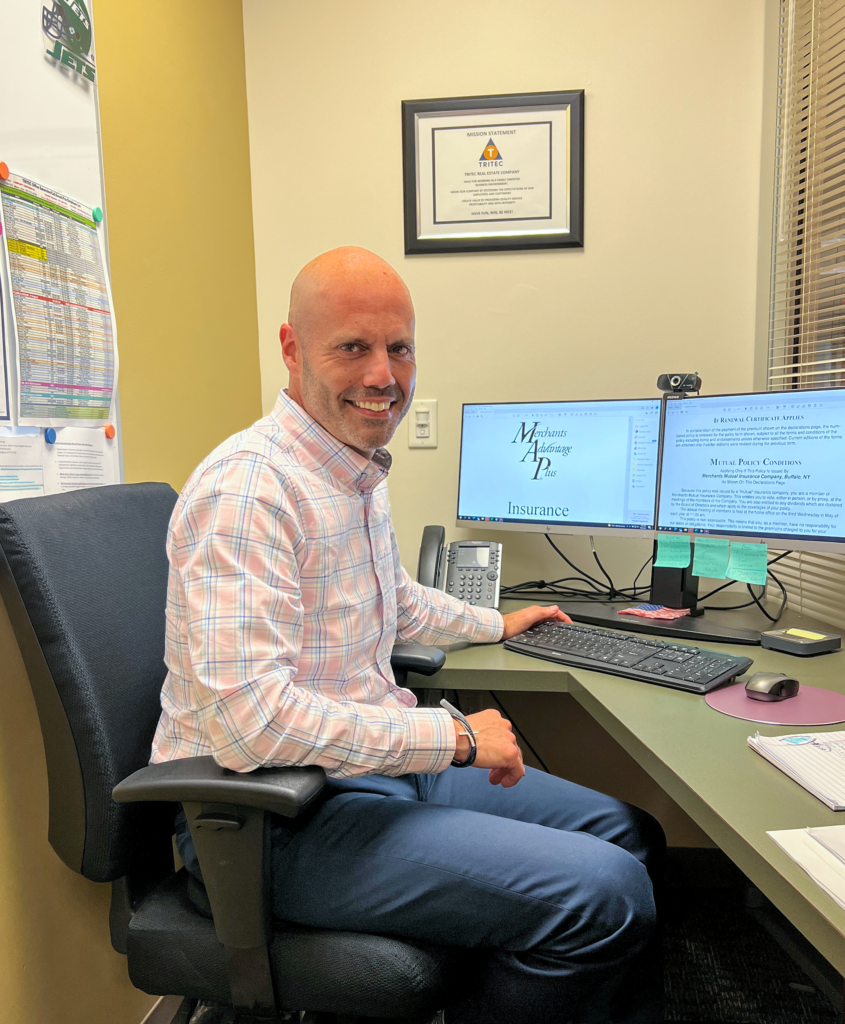
“Every day I work with our subcontractors and/or their insurance brokers to ensure that all their lines of insurance coverage are compliant according to our TRITEC requirements. I’m in constant communication with them via email or phone to follow up and confirm that we have the proper documents in order. Once we do, they go to our Risk Manager for final review. We must make sure the subcontractor’s insurance is compliant and up to date, so they are able and continue to work safely on TRITEC construction sites.
It’s essential to be detail orientated in this role because you must look over all endorsements and policies to confirm everything is correct to ensure proper coverage. Also, since we have multiple subcontractors on multiple projects, each project may require different limits or special lines of coverage so you must have great follow-up skills. It can be a lot of information to keep track of at once.
Teamwork is very important because there are so many moving parts with insurance, so the more you can work together the easier the process can be. Recently, we had multiple subs needing to be compliant because all their insurance was renewed. I sat with my manager to make a game plan, we were able to split the list of subcontractors and we both worked on calling and emailing. We were able to get the documents we needed, send them to our risk manager, and be on our way to being compliant.
“If you like analyzing things, problem-solving, getting things in order, and putting the pieces of a puzzle together, then this may be the position for you.”
I learn every day on the job by interacting with my Insurance Policy Compliance Manager Jennifer Mandemaker and asking a lot of questions. As an Insurance Administrator, I will continue my education by pursuing my CRIS certification, which is the Construction Risk and Specialist program. This program specializes on the insurance and risk management needs of construction projects and contractors. This would be the next step for me. A piece of advice I would give someone looking to become an Insurance Administrator is if you like analyzing things, problem-solving, getting things in order, and putting the pieces of a puzzle together, then this may be the position for you.”
Tom Nagel
Assistant Project Manager
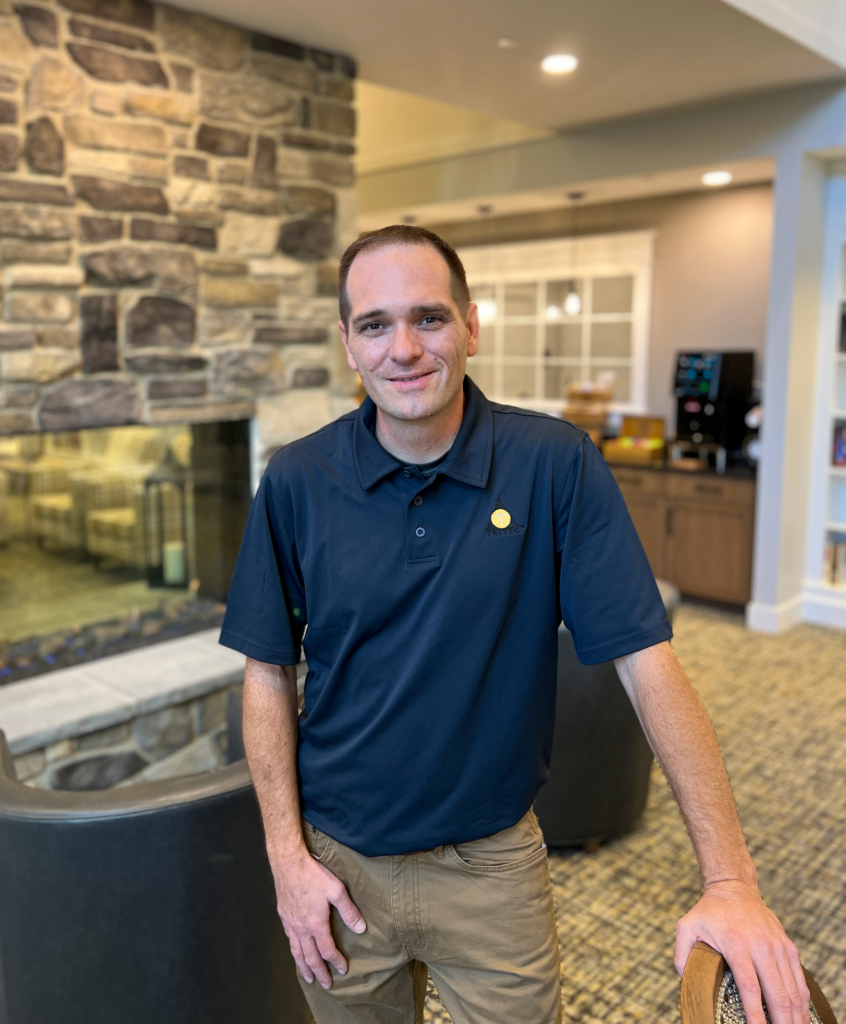
“Before coming to TRITEC, I had previously worked in carpentry and site supervision in residential and commercial contracting and received an education in construction management. I have held different positions within the company including superintendent, project engineer, and assistant project manager. In my current role as an assistant project manager on the Brightview Senior Living Port Jeff site, I perform various daily tasks including submittal and contract scope review, field coordination with designers and subcontractors, and updating the client and design team on jobsite progress. A great part of my job is the unpredictability of assigned tasks or issues that might come up. No two workdays are the same, and I might find myself either in the office, involved in a meeting, or needed at the jobsite to work on a task—sometimes all within one day.
As part of my role, I help to ensure that a project stays on track by different methods depending on the phase of a job and the work activities that happen at different times. Early in a project, or before any work is started, one of my responsibilities is to identify and request documents or drawings that require approval by the design team before that specific work can begin. One product or drawing review can take weeks or months to arrive at final approval, which requires this task to be reviewed daily to make sure that a pending approval will not negatively impact the jobsite activities and project schedule. Towards the end of a project, the focus shifts to an “all hands on deck” approach to identifying and completing punch list items. During this phase, organization and daily communication with subcontractors are critical items that are needed for project completion.
“These past experiences are invaluable for viewing and overcoming new issues that you might face.”
Those with experience in the construction industry often refer back to their past projects and issues that they were able to overcome to help them with their current projects. These past experiences are invaluable for viewing and overcoming new issues that you might face. It’s also important to be flexible and open-minded. The “we’ve always done it this way” method is not always the way to approach a task. I’ve learned that using past experiences and keeping up to date with new methods and education is the best way to tackle current issues. The recent disruptions to material supply and delivery systems have proven that you need to use all available knowledge and resources to overcome project hurdles. As products and construction methods are constantly being improved and updated, the readiness to keep up with those changes is something that can contribute to a successful project. Another important skill to have in this industry is effective communication. Whether dealing with a designer, client, or subcontractor, the ability to clearly and efficiently share accurate information in both directions is important for project success.”
Rick Delgiorno
Superintendent
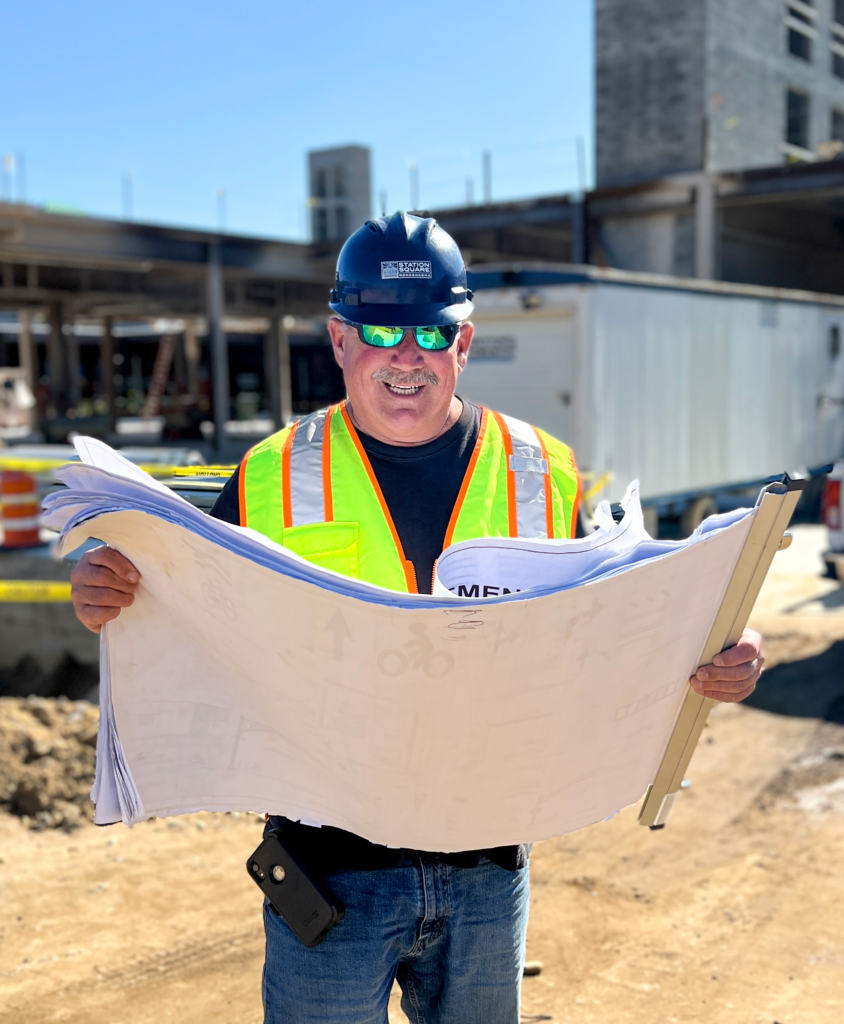
“When you’re a superintendent, it’s not what you do every day, but it’s getting ready the days and nights before that day. To get the most productivity, you must plan each day and the next day after. If there are delays in terms of weather, manpower, or material, you must change the plans to keep the rhythm. Sometimes, you feel like a coach; all the players need direction, and you must be ready to change immediately and guide the team accordingly. You must do all this planning and scheming, but most of all, do it safely and make a profit. You must round out all the duties and delegate as needed.
“You can’t be afraid of the schedule, money, size, or difficulty of the projects. Take it one brick at a time. Bite chunks off a time but realize the ‘big platter’.”
We try to keep the field team grounded, like a divorced team of misfits. During this time, we try and laugh and have fun and not think of how big the project is. They can be overwhelming. You can’t be afraid of the schedule, money, size, or difficulty of the projects. Take it one brick at a time. Bite chunks off at a time but realize the ‘big platter’.
One of my favorite parts of my career is gaining knowledge from our design professionals and discussing the project with them as we build it, knowing they acknowledge your input and really value it. There is no end to learning out on the field.”
Nicole Martens
Construction Administrator
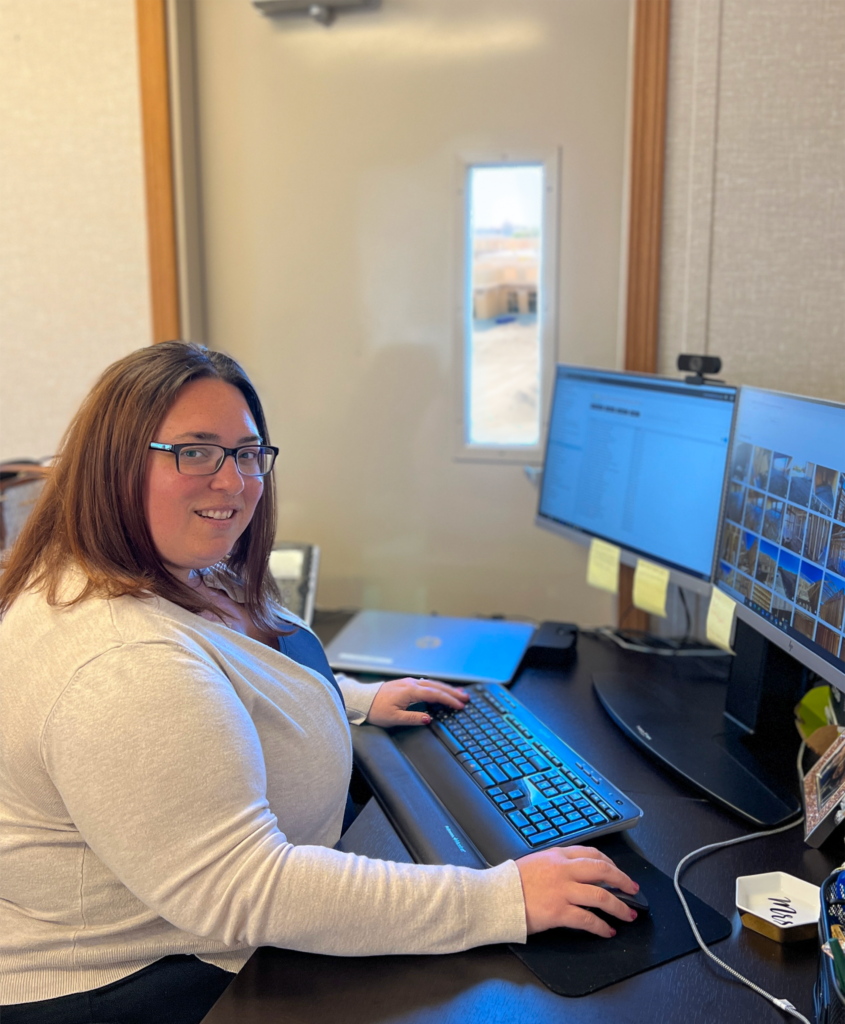
“My regular day-to-day duties include all administrative work for the Bay Shore project. That includes putting together subcontractor contracts, organizing project reports, gathering information to apply for permits, keeping track of all the subs on-site for insurance purposes, gathering subcontractor pay applications and all supporting documentation for submission to ownership for payment, and assisting the project managers in any tasks needed, ordering supplies, and making sure the project team has everything they need to perform their job duties.
“Some things can change on-site daily and we need to be ready to deal with whatever issues arise on a given day.”
I think it’s crucial for construction administrators to be organized, flexible, and communicate effectively. There is so much paperwork and reports that come along with these projects, and you have to know how to store and organize all of these documents so that they can be referenced very quickly and provided when needed. We also need to be very flexible in that not every day is the same. Some things can change on-site daily, and we need to be ready to deal with whatever issues arise on a given day. You also need to be an effective, strong communicator, especially being a woman on a job site full of men.
Challenges come up quite often on these big projects. Recently, the big challenge has been making sure we can get all of the material in that is needed to keep the project progressing along. We have managed to avoid issues by planning ahead and making sure we have many different options available to us. The best thing about working on a construction site is that things are constantly changing every day. Whenever I feel stressed or need to take a break, I can always go outside and take a walk around to check out the progress being made. Sometimes just being outside and getting some fresh air, and taking in the project, is enough to break whatever stress I may be feeling.
A piece of advice I would give someone who is thinking of becoming a construction administrator is to pay attention to all of the details. Sometimes, even the smallest details could be the most important in ensuring the project is successful.”
Christopher Spina
Project Manager

“My career in construction began once I accepted an offer to work for NVR, Inc. after receiving my undergraduate degree. Once I took a step into the construction industry, I did not look back. I have enjoyed roles as assistant superintendent, superintendent, assistant project manager, cost estimator, and currently project manager. I have a true respect for the industry, as it is complicated and challenging. Being a project manager puts you on the front lines and I seek to work onsite and in the action.
The title, ‘project manager’ has many different applications, roles, and complexities. In my role, it starts with assisting to prepare an accurate estimate for the cost of work, accurate shop drawing preparation, and then a high-quality installation. After the preparation of shop drawings and submittal approval, I work closely with our field superintendent staff to ensure they have the support required to execute the project at a high pace. I also act as a conduit for the RFI process. Working closely with the designers, draftsmen, and fellow project managers is critical to resolving building difficulties and maintaining schedules, which leads to budget adherence.
In my experience, project managers and other leaders in the industry have unique skill sets that allow them to be successful. Having the mindset that, “what is best for the project is best overall” will lead you in the right direction. It is based on an honest approach rooted in integrity and a fundamental focus on quality at all levels. The result is an improved physical environment or a new building for a trusting client.
“If your goal is to work in the construction industry, make choices that broaden your experience, respect the tried and tested leaders, and never stop asking questions.”
If your goal is to work in the construction industry, make choices that broaden your experience, respect the tried and tested leaders, and never stop asking questions. Any day can turn you into a rookie, so keep your hand on the wheel and use good judgment when making decisions. I continue learning by pushing myself to seek larger and more complex projects. I also try my best to dig into the technical features and logistical challenges of every project I work on and take away small pieces of experience that will hopefully assist me in the future. I believe it is imperative to continue learning, it is not a choice, it is a mindset. Without it, you will not make it successfully. Bottom line.”
Denny Li
Project Engineer
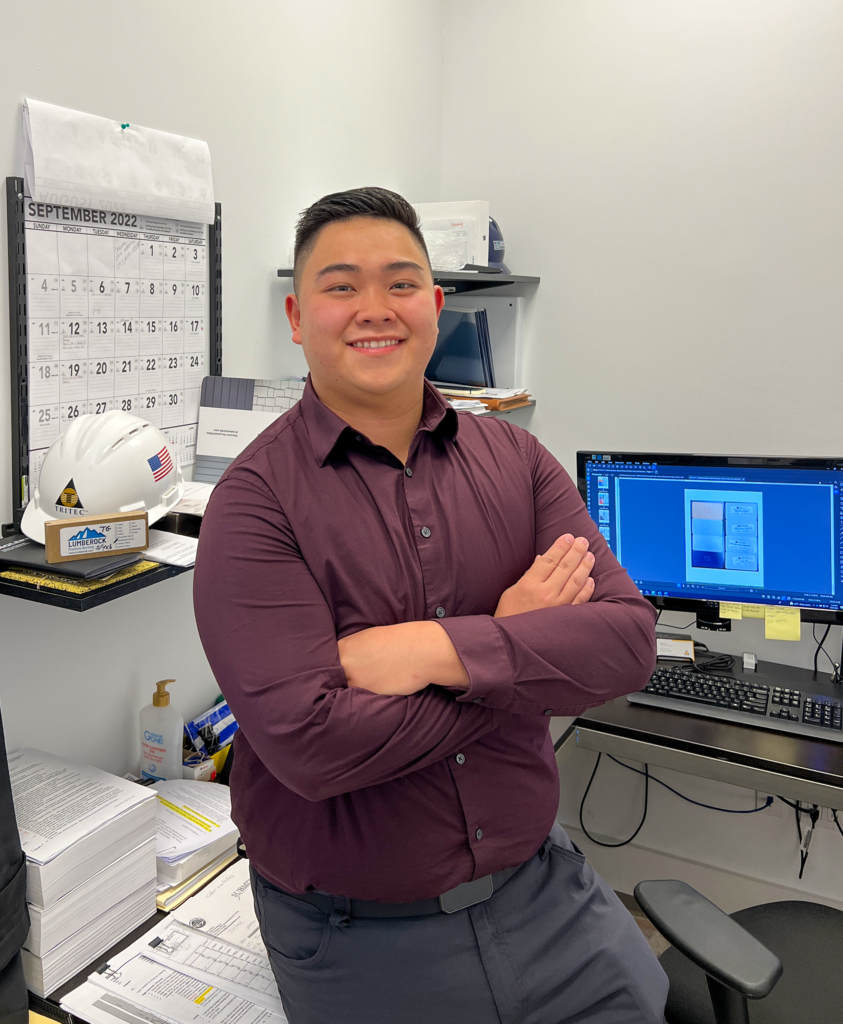
“On a day-to-day basis, I look over my emails to see if any urgent submittals or RFIs had been returned from the architect or engineer to be distributed back to our subcontractors as soon as possible. I make sure to review my to-do list to see what needs to be completed soon, which is the best way to keep organized. At times we will get new drawings or sketches from the architect/engineer, and I would have to review the drawings to make sure all changes have been called upon, either clouded in the drawings or written in the narrative. I would sometimes be in meetings with the architect/engineer depending on the topic we are discussing; the majority would be the subcontractor/field supervisor requesting more information not shown in the drawings. If a field safety inspection was done on-site, I would have to review it and see if there is any non-conforming work for the field supervisors to complete to make our job site 100 percent safety compliant.
“This advice leads to another important skill to have, which is to trust yourself but don’t be afraid to ask others for help.”
Providing accurate and consistent work is very important to me because I want to make sure my team can depend on me when they are looking for information in submittals, RFIs, and drawings. To ensure that I am accurate with my work, I tend not to rush through it and will check my work with the project team if I am not 100 percent sure. I am constantly learning how to provide the highest quality work through my team members. Although every day I review new submittals and RFIs, there are times when I find an issue that isn’t answered by the architectural drawings or the specification. In these instances, I reach out to team members who have dealt with this issue before, and they are able to help me resolve it with their experience. It’s important that you are always looking to learn and are not afraid to fail. I’ve learned that everyone makes mistakes, but it is what you do with those mistakes that help you learn and better yourself. This advice leads to another important skill to have, which is to trust yourself but don’t be afraid to ask others for help.
The most recent challenge I experienced was back in August when the project team needed to pass the town inspection to continue framing our building. This was a challenge because we did not want to delay our wood panels’ installation time. Many tasks assigned by the town needed to be completed before the next level of trusses or panels could be installed such as inspection of concrete slab, wood sheathing approval, and proper nail installation. We were able to communicate with the engineers through many emails and phone calls to get submittals and documentation of approval to the town. After a week and a half of consistent emails and phone calls, we got the approval to continue framing the next levels.”
Kyle Bollhofer
Assistant Project Manager
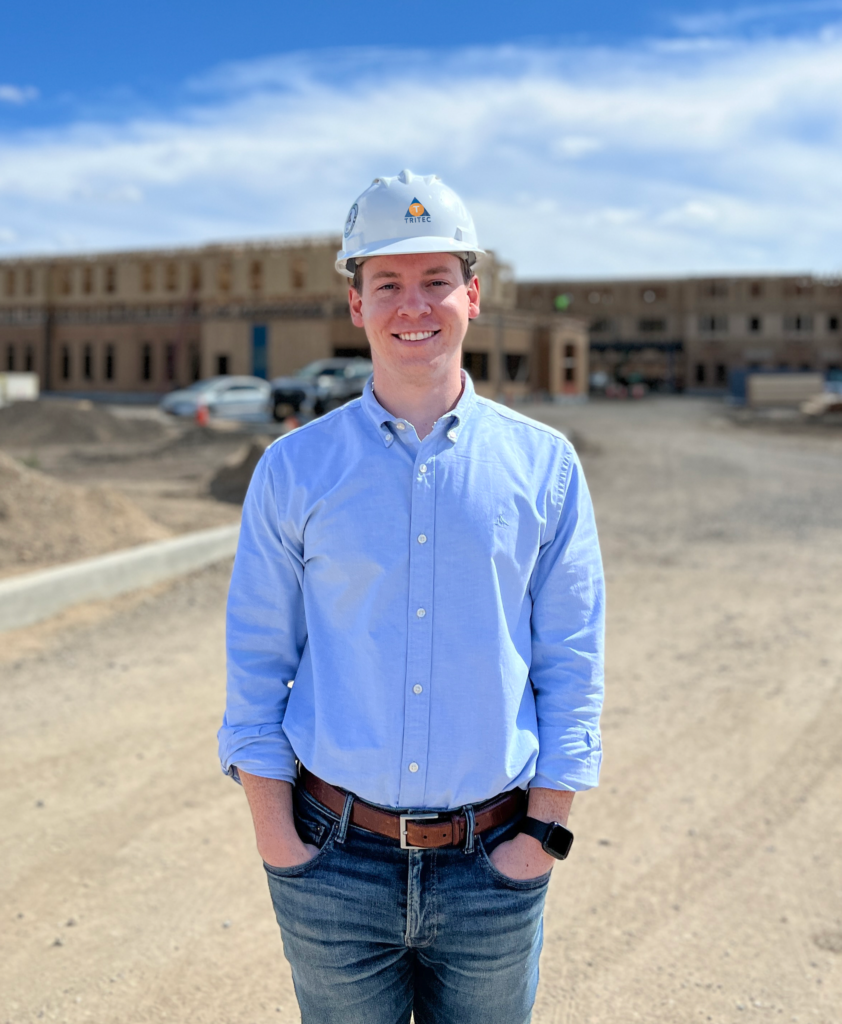
“As an assistant project manager, I help review and approve all incoming materials and schematics from our subcontractors and ensure that everything is coordinated with our field team. I also assist in maintaining the financial aspects of the project like procurement and change orders.
I originally started out at TRITEC in pre-construction and estimating before moving into the project management team. I was a Project Engineer for most of my time while building The Wel in Lindenhurst before I became an Assistant Project Manager.
I’ve learned that getting ahead of the project is always helpful. When you do the necessary work before it’s needed, it ensures that the project keeps moving smoothly and gives you additional time to review any potential cost-impact issues. This means that special attention to detail is critical. There are many different drawings, specifications, and submittals from subcontractors that all have to be coordinated and reviewed together. Also, there are numerous trades simultaneously on-site, so prioritization and time management is important.
“Making the subcontractors another extension of our team results in a project that we can all be proud of.”
With so many trades on-site, I have to make sure to effectively coordinate and communicate with our subcontractors to give us the best chance for success. We provide them with all of the information that they need from our design team and from the other subcontractors, and they tell us if they have any issues or if they can do something more effectively. Making the subcontractors another extension of our team results in a project that we can all be proud of.
I try to constantly keep myself involved with all different aspects of the job, especially those that I don’t deal with every day to keep learning. Learning a new thing every day is a great thing to help you grow and gain a better understanding and appreciation of what is going on all around you.”
Alissa Merkle
Assistant Controller
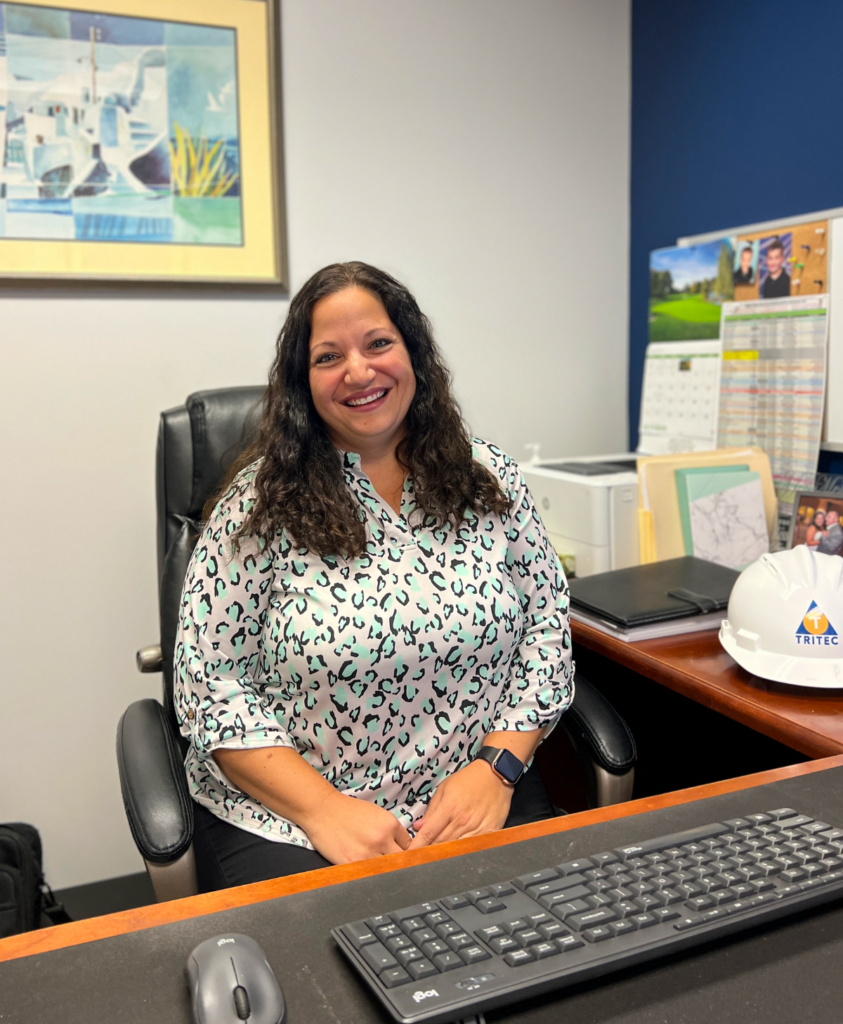
“I graduated from James Madison University with a BBA in Accounting and wasn’t sure if I wanted to work for a public firm but I knew I wanted to come back to Long Island. After a few weeks of interviews in and out of NYC, there was an opportunity to work here at Tritec as a Junior Accountant. I’ve been lucky enough to work in several positions within the department through the years, working with property management, development projects, and construction, learning all aspects of the business. I have been Assistant Controller since 2017, focusing on the financial reporting for Tritec Building Company.
Although reporting deadlines are typically consistent throughout the month or year, my workday is always different. Between financial statement and cash flow analysis, invoice review and approvals, payroll processing, tax and audit prep, it’s a mixed bag of review, processes, and procedures that keeps things interesting every day. I think the best way to handle pressure and stress is to be organized. For me, to-do lists, at work and at home, help me prioritize, keep me accountable, and help with time management. Besides good communication skills, the ability and willingness to listen and learn is vital. After 20 years here, I’m still learning.
“Having a great team is key to success. I’ve always felt that in order to manage well, it’s important to understand what each team member does and the value they bring to the department and organzation.”
Any challenges faced, we work as a team to overcome. Having a great team is key to success. I’ve always felt that in order to manage well, it’s important to understand what each team member does and the value they bring to the department and organization. Understanding the workflow and how things are done enables me to help others when help is needed or guide them in the right direction.
The world is constantly changing, so it’s very important to continue learning. It could be formal classes from an accredited school, seminars, or employee enrichment programs. It could also be informal learning within an organization, like our Tritec University lunches, where a team member teaches others about a certain aspect of the organization, shares their knowledge on certain software, or gives others a better idea of what their position within the organization entails. I’ve learned so much about the construction industry from Tritec team members throughout my career here. From project executives to construction administrators, it’s important to understand their roles and work together to deliver a successful project. I’m currently pursuing my MBA in Accounting. Luckily, I’m able to do so with online courses. Working full-time and continuing my education with two young boys at home can be challenging, but I hope to show my children and others in similar positions that continued education is important and possible at any stage in your career.”
